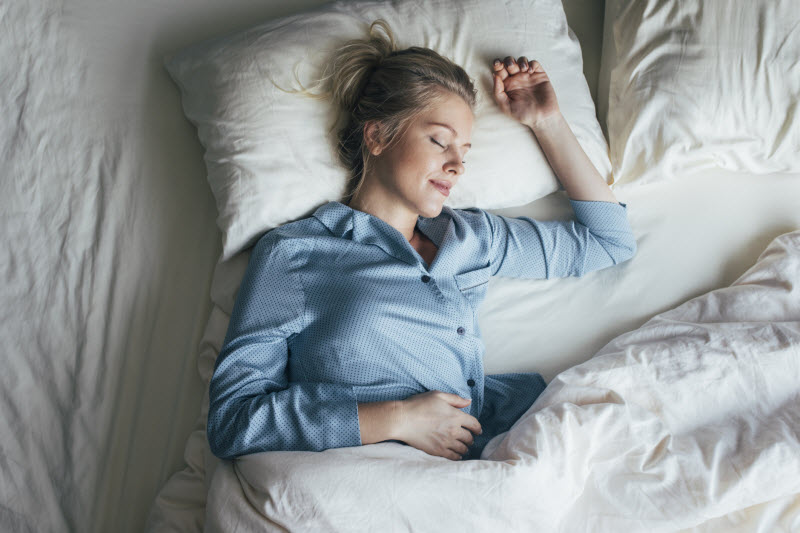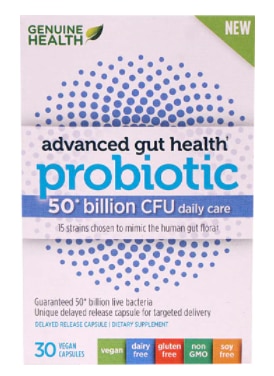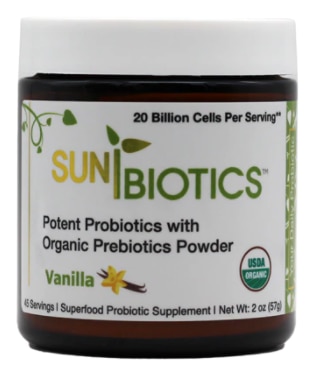Getting a good night’s sleep is one of the most important things you can do for your health, but more than one-third of all adults in the U.S. are falling short.
According to the American Sleep Association, 35.3% of adults report getting less than the minimum recommended seven hours of sleep per night. Globally, 62% of adults wish they were getting more sleep, and 44% say that their sleep quality has gotten worse over the last five years.
At the same time, 60 to 70 million Americans suffer from digestive diseases, and 40 million people around the world are living with functional digestive disorders.
Coincidence?
Not at all. Research suggests that what goes on the gut microbiome can have an effect on how much and how well you sleep. If you’re among the many who struggle to get enough quality shut-eye, improving your gut health might be the answer.
Gut health and sleep: how the gut microbiome affects sleep
Your gut influences your brain via the vagus nerve using chemical messengers like serotonin, dopamine, melatonin and GABA, all of which are neurotransmitters associated with sleep.
Serotonin in particular plays a role in the sleep cycle as both a melatonin precursor and a regulator. This neurotransmitter appears to create “pressure” to go to sleep that peaks near the end of the day. Your gut microbiome also has a daily cycle, which may work together with serotonin to influence your circadian rhythm.
But that’s not all. Science suggests that bacterial composition and balance within the gut itself may directly impact sleep. Studies have shown that:
- Higher microbial diversity is associated with better sleep quality and might improve alertness when you don’t get enough sleep
- Total microbial diversity can help you stay asleep and get more sleep each night
- A diverse microbiome may control levels of the proinflammatory cytokine IL-6, which can influence sleep quality
- Bacterial overgrowth may be associated with metabolic problems that arise from sleep loss
- Gut disorders like irritable bowel disease, which are often associated with microbial imbalances, can affect sleep quality and daytime alertness, as well as how often you wake up during the night
Can skimping on sleep hurt gut health?
The gut-brain influence works both ways: Not only does your gut affect your sleep, but not sleeping enough—or getting poor quality sleep—can throw your gut out of balance.
Inflammation appears to play a key role in this effect. When you don’t sleep, the levels of proinflammatory compounds in your body rise while both anti-inflammatory compounds and antioxidant activity decrease. You also make fewer of the proteins that keep your gut barrier strong, which can result in the increased intestinal permeability commonly known as “leaky gut.” This loss of permeability may be related to the lower melatonin levels that result from getting too little sleep. In a mouse study, researchers found that sleep-deprived mice with leaky gut got better when given a dose of melatonin to counteract the drop.†
Inflammation can also make it more difficult to benefit from microbial byproducts like short-chain fatty acids (SCFAs). One study showed that people who excrete higher amounts of SCFAs take longer to fall asleep and sleep fewer hours, suggesting that SCFA absorption, not just SCFA production, may be a key part of sleep health.†
But you might not produce enough SCFAs in the first place if you’re too tired to make healthy food choices. Lack of sleep puts your body in a stress state and decreases your ability to use good judgment. This combination is likely to drive you toward foods high in saturated fat and refined carbohydrates, which can increase types of bacteria in your gut that produce proinflammatory byproducts.
Better sleep, better gut (and the other way around)
Since sleep influences gut health and gut health affects sleep, adopting habits that support both is the best way to enjoy mutual benefits.
Fix bad sleep habits
Set yourself up for better sleep each night with these simple changes to your sleep routine and environment:
- Establish—and stick to—a set sleep and wake time
- Support your circadian rhythm by getting exposure to natural or bright light during the day
- Use an app that gradually decreases blue light on devices in the evening
- Reduce light in the bedroom as much as possible by using blackout curtains, removing digital devices and switching to a traditional alarm clock
- Turn off all screens, including the TV, 60 to 90 minutes before bed
- Don’t drink any caffeinated beverages for at least 6 hours before going to sleep
- Avoid alcohol before bed
Clean up your diet
What you eat directly affects gut microbe types and diversity, as well as the daily microbial rhythms that influence your circadian rhythm. Eating more whole and minimally processed plant foods provides prebiotic fiber that feeds beneficial gut bacteria, leading to improved diversity and increased SCFA production. These foods are anti-inflammatory, which can promote healing from leaky gut.
Although you can also influence your gut’s bacterial composition with probiotics, there’s not a lot of scientific evidence to show that adding a supplement can help you sleep. Studies correlating probiotic supplementation with better sleep usually show subjective improvements rather than measurable sleep changes.
You should start to see improvement in both your gut health and sleep patterns once you start making these changes. However, if your sleep doesn’t improve or you have ongoing problems with gut health, talk with your doctor about other possible causes and treatments.
†These statements have not been approved by the Food and Drug Administration. These products are not intended to diagnose, treat, cure or prevent disease.




